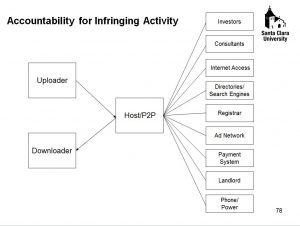Cloudflare Isn’t Liable for Providing Services to Alleged Infringers–Mon Cheri Bridals v. Cloudflare
 The plaintiffs claim copyright ownership in wedding dress designs. They also claim that knockoff retailers are infringing those rights. Frustrated by the whack-a-mole enforcement efforts against individual retailers, the plaintiffs sued Cloudflare for providing support services to them, including caching, content delivery, and security services. The district court grants summary judgment to Cloudflare.
The plaintiffs claim copyright ownership in wedding dress designs. They also claim that knockoff retailers are infringing those rights. Frustrated by the whack-a-mole enforcement efforts against individual retailers, the plaintiffs sued Cloudflare for providing support services to them, including caching, content delivery, and security services. The district court grants summary judgment to Cloudflare.
The issue is whether Cloudflare materially contributes to the infringement. The court says “Simply providing services to a copyright infringer” isn’t enough. Instead, the service must “facilitate access to infringing websites in such a way that significantly magnifies the underlying infringement” or act as “an essential step in the infringement process.”
With respect to the caching/content delivery services, Cloudflare didn’t significantly magnify the infringements because there’s no evidence that faster load times increase the quantum of infringement. Similar, Cloudflare’s services weren’t an essential step in the infringement because infringements could still take place even if Cloudflare terminated its services.
The court reaches the same result for Cloudflare’s anti-DDOS service. The court suggests the results might be different if Cloudflare’s services hindered the rightsowner’s ability to find the infringer, but Cloudflare’s notice-and-notice practice sufficiently aids the rightsowner. This is consistent with the uncited Ninth Circuit ruling in ALS Scan v. Steadfast.
This ruling has potentially significant implications for “tertiary” infringement claims. As depicted in the chart above, copyright owners are interested in suing the folks on the left (direct infringers), their service providers (the folks in the middle, the secondary infringers), and the vendors to the service providers (the folks on the right, tertiary infringers). Over the past couple of decades, we’ve seen copyright owners include more entities from the right column–as evidenced by this case, where the copyright owner basically sought a deep pocket to pay for the allegedly infringing activity of dozens of individual defendants. In other words, the copyright owner wanted one-stop-shopping for allegedly infringing activity across the Internet. The court rejected this expansive view of liability, essentially holding that Cloudflare wasn’t the proximate cause of any infringing behavior. If followed by other courts, that approach should help with other tertiary infringement claims.
Case citation: Mon Cheri Bridals, LLC v. Cloudflare, Inc., 3:19-cv-01356-VC (N.D. Cal. Oct. 6, 2021)
